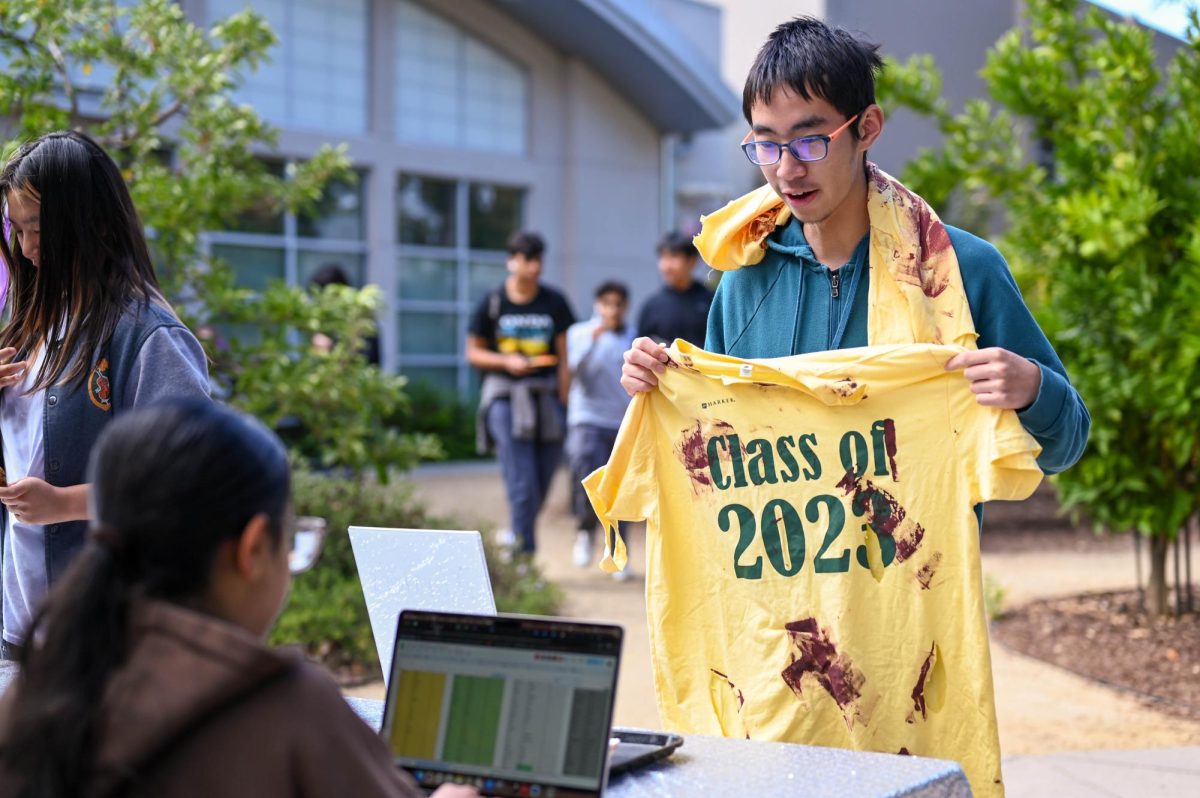Humans of Harker: Rishi Iyer positions himself in the space between categories
“One time, I just went over to [my friend]’s house,” Rishi Iyer (12) said. “I asked him, ‘What do you want to do?’ and he was like, ‘Let’s just get in the car and drive around and explore.’ We went into downtown Saratoga, and we took a turn on some random road that looked pretty steep, and we went along it for thirty minutes, and it became this really narrow one lane road going up the mountain, and we eventually just made our way up the mountain, just exploring all these little side roads until we eventually found this little clearing with this amazing view of the entire Bay Area. It was so surreal, just going from being in the house, saying, ‘Let’s just find something’ and just discovering this, just by messing around.”
May 28, 2018
Rishi Iyer (12) handles obstacles in stride, choosing to see them as humorous “L’s” in the win-loss record of life.
“Say some major setback happens in life, or you fail a test, or you get in a car crash or something,” he said. “There are two ways you can go about it: you can either be super down about it and feel really upset, or — like I sometimes do — just send a Snapchat about it with some funny caption to kind of take the weight off everything, and try to turn it around into something that can be laughed about and remembered in a good way rather than a negative way.”
Rishi’s friends know him for his droll, almost irreverent outlook.
“Within his jokes he finds common ground with people,” his close friend Rahul Mehta (12) said. “He gets people to connect with him, and that’s really his way into people’s hearts. By making fun of himself and using self-deprecating humor, he opens up conversations.”
His advisor, economics teacher Mr. Samuel Lepler, recognized his leadership potential and humor starting at freshman orientation.
“He immediately led our advisory on the field. He was making jokes, and he was trying to get us to pull the A-frame together, so he would make ridiculous noises,” Lepler said, attempting to imitate the irreproducible screech. “And it was working — we were cracking up, but we were pulling totally in unison. Nobody made him do that; nobody put him in that position — he just did it.”
While Rishi’s underclassman years were defined by structured activities, his upperclassman years have seen a surge of spontaneity. Instead of asking himself “why,” he asks “why not?”
“Now, I just find someone and just say, ‘Hey, do you want to go here?’ or ‘Check out this,’” he said. “And we just go on these adventures. It’s not really a conscious thing. It’s more about not worrying about exactly what’s going to happen, and being okay with jumping into the unknown.”
To Rishi, “jumping into the unknown” means piling up in one car with his friends, driving around until inspiration strikes.
“One time, I just went over to [my friend]’s house,” he said. “I asked him, ‘What do you want to do?’ and he was like, ‘Let’s just get in the car and drive around and explore.’ We went into downtown Saratoga, and we took a turn on some random road that looked pretty steep, and we went along it for thirty minutes, and it became this really narrow one lane road going up the mountain, and we eventually just made our way up the mountain, just exploring all these little side roads until we eventually found this little clearing with this amazing view of the entire Bay Area. It was so surreal, just going from being in the house, saying, ‘Let’s just find something’ and just discovering this, just by messing around.”
Rishi also describes computer science as a “landscape” of sorts — a constantly evolving field that thrives on whimsy.
“If I think of something, like hey, maybe I can come up with a script to do my electronics calculations for me, then why not?” he said. “Instead of thinking about whether or not I should do it, or thinking about the pros and cons, by that time, I could have just done it. So I just take that idea and run with it.”
Instead of depth, he aims for breadth.
“Everyone kind of has their thing — everyone’s like a programmer or an athlete or an artist or something, and I don’t really fall into those defined categories. I’m more of a jack-of-all-trades, master of none,” he said. “But I prefer it that way, because I’d rather be aware of everything and have an appreciation for everything than just care about one thing completely.”
This perspective translates to his taste in music. He has gained exposure to wide swath of songs through what he calls the “magic of Spotify’s curated playlists.”
“All of our friends had the same interest in hip-hop and rap and stuff like that, but once you kind of dig deeper into it, you realize how many different genres play a role in it,” he said. “It takes everything from soul to funk to pop to classical music — everything blends together to form this sort of mutt of a genre. I guess I always find that really cool, because it applies to different aspects of life and maybe CS in general — you take everything and take inspiration from a variety of sources, and then you can get a big picture of life and then mold yourself appropriately without excluding a certain aspect of yourself.”
Music has given him an open mind about various genres and sounds, regardless of origin.
“Looking at me, no one would think for a second that I like funk music from Oakland in the ’70s,” he said. “I didn’t really choose to follow a certain boundary and say like, ‘Oh, this is old music that’s not really my style, so I’ll just brush it off and dismiss it.’ But rather, I would just give it a listen and then appreciate what it has to offer. It’s different, but different doesn’t necessarily mean bad.”
He listens to an eclectic mix of artists: Childish Gambino, Flatbush Zombies, Tower of Power, Hans Zimmerman, Kanye West.
“There’s no common thread,” he said, pausing as he shook his head. “Except maybe a mutual respect for one another.”


















![“[Building nerf blasters] became this outlet of creativity for me that hasn't been matched by anything else. The process [of] making a build complete to your desire is such a painstakingly difficult process, but I've had to learn from [the skills needed from] soldering to proper painting. There's so many different options for everything, if you think about it, it exists. The best part is [that] if it doesn't exist, you can build it yourself," Ishaan Parate said.](https://harkeraquila.com/wp-content/uploads/2022/08/DSC_8149-900x604.jpg)




![“When I came into high school, I was ready to be a follower. But DECA was a game changer for me. It helped me overcome my fear of public speaking, and it's played such a major role in who I've become today. To be able to successfully lead a chapter of 150 students, an officer team and be one of the upperclassmen I once really admired is something I'm [really] proud of,” Anvitha Tummala ('21) said.](https://harkeraquila.com/wp-content/uploads/2021/07/Screen-Shot-2021-07-25-at-9.50.05-AM-900x594.png)







![“I think getting up in the morning and having a sense of purpose [is exciting]. I think without a certain amount of drive, life is kind of obsolete and mundane, and I think having that every single day is what makes each day unique and kind of makes life exciting,” Neymika Jain (12) said.](https://harkeraquila.com/wp-content/uploads/2017/06/Screen-Shot-2017-06-03-at-4.54.16-PM.png)








![“My slogan is ‘slow feet, don’t eat, and I’m hungry.’ You need to run fast to get where you are–you aren't going to get those championships if you aren't fast,” Angel Cervantes (12) said. “I want to do well in school on my tests and in track and win championships for my team. I live by that, [and] I can do that anywhere: in the classroom or on the field.”](https://harkeraquila.com/wp-content/uploads/2018/06/DSC5146-900x601.jpg)
![“[Volleyball has] taught me how to fall correctly, and another thing it taught is that you don’t have to be the best at something to be good at it. If you just hit the ball in a smart way, then it still scores points and you’re good at it. You could be a background player and still make a much bigger impact on the team than you would think,” Anya Gert (’20) said.](https://harkeraquila.com/wp-content/uploads/2020/06/AnnaGert_JinTuan_HoHPhotoEdited-600x900.jpeg)

![“I'm not nearly there yet, but [my confidence has] definitely been getting better since I was pretty shy and timid coming into Harker my freshman year. I know that there's a lot of people that are really confident in what they do, and I really admire them. Everyone's so driven and that has really pushed me to kind of try to find my own place in high school and be more confident,” Alyssa Huang (’20) said.](https://harkeraquila.com/wp-content/uploads/2020/06/AlyssaHuang_EmilyChen_HoHPhoto-900x749.jpeg)



![“One time, I just went over to [my friend]'s house,” Rishi Iyer (12) said. “I asked him, 'What do you want to do?' and he was like, 'Let's just get in the car and drive around and explore.’ We went into downtown Saratoga, and we took a turn on some random road that looked pretty steep, and we went along it for thirty minutes, and it became this really narrow one lane road going up the mountain, and we eventually just made our way up the mountain, just exploring all these little side roads until we eventually found this little clearing with this amazing view of the entire Bay Area. It was so surreal, just going from being in the house, saying, 'Let's just find something' and just discovering this, just by messing around."](https://harkeraquila.com/wp-content/uploads/2018/05/RishiIyer-MK-900x601.jpg)






